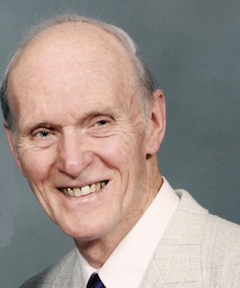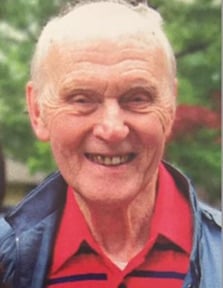Robert Gathman
 Robert F. Gathman Robert F. Gathman (Bob) of Totowa, NJ, formerly of Paramus, NJ, passed away on April 21, 2019. He was born in Prospect Park, NJ on Oct. 22, 1921, the son of Martha Gosman Gathman and William Gathman. He was preceded in death by his dearly beloved wife, Antoinette Gathman, his sister, Dorothy E. Djuren, and his brother, David W. Gathman. He is survived by devoted daughters Jeanne Gathman and Nancy Glime (Fred), grandchildren Chris Glime (Mary Kate), Lauren Wilson, (Jim), and great grandchildren Natalie Glime, and Turner and Everett Wilson. A decorated Army veteran of WWII, Bob served in seven major battles and received four medals. After his honorable discharge in 1945, Bob worked as a linotype operator at several newspapers for many years. In 1977, he and his wife, Antoinette, co-founded The Speak Easy International Foundation, a Self-Help Mutual Aid Group for People Who Stutter. Antoinette was named Co-Founder; Bob was named Founder-President.
Robert F. Gathman Robert F. Gathman (Bob) of Totowa, NJ, formerly of Paramus, NJ, passed away on April 21, 2019. He was born in Prospect Park, NJ on Oct. 22, 1921, the son of Martha Gosman Gathman and William Gathman. He was preceded in death by his dearly beloved wife, Antoinette Gathman, his sister, Dorothy E. Djuren, and his brother, David W. Gathman. He is survived by devoted daughters Jeanne Gathman and Nancy Glime (Fred), grandchildren Chris Glime (Mary Kate), Lauren Wilson, (Jim), and great grandchildren Natalie Glime, and Turner and Everett Wilson. A decorated Army veteran of WWII, Bob served in seven major battles and received four medals. After his honorable discharge in 1945, Bob worked as a linotype operator at several newspapers for many years. In 1977, he and his wife, Antoinette, co-founded The Speak Easy International Foundation, a Self-Help Mutual Aid Group for People Who Stutter. Antoinette was named Co-Founder; Bob was named Founder-President.
In 1983, Bob received a B.A. Degree in Humanities from Thomas A. Edison College. In 1987, he received an M.A. in Communication Sciences & Disorders from Montclair State University. Bob received the Outstanding Adult Student and Lifelong Learner Award, the MSU Alumni Association Award as founder of Speak Easy, and along with his wife, the President’s Volunteer Action Award Citation signed by President Ronald Reagan for their work with Speak Easy. Upon receiving his Certification of Speech Language Specialist, Bob worked as a speech-language specialist until his retirement in 1998. He and his wife planned and organized 23 Annual Speak Easy Symposia through 2003. Bob carried on following her passing until 2014. He was also an accomplished writer, writing many articles well into his nineties for the Speak Easy Newsletter, which was published quarterly.
Bob was a long-time member of the Fair Lawn Bible Church, where he was a trustee for several years. He was also an accomplished trumpet player, well known for his solo work in several area churches, and in New York. In past years he played with the German M.E. Church Temple Orchestra, Junior Symphony Orchestra of Paterson, Ridgewood Symphony Orchestra, and the Rutherford Community Band. He was President and Senior Member of the Hawthorne, NJ Fireman’s Marching/Concert Band which he joined in 1941. In 2010, he received a lifetime achievement award for outstanding and dedicated service to the band. On his 95th birthday in 2016, Bob received a pin for 75 years of membership with the Hawthorne Band.
The family will receive relatives and friends on Saturday, April 27, from 10-11 a.m. with an 11:00 a.m. service at the Vander Plaat-Caggiano Funeral Home, 13-31 Saddle River Road, Fair Lawn, NJ. Interment will follow at George Washington Memorial Park, 234 Paramus Road, Paramus, NJ. In lieu of flowers, donations may be made in memory of Robert Gathman to The Association of Concert Bands, 6613 Cheryl Ann Drive, Independence, OH 14131 or acbands.org.
Obituary copied with gratitude from Vander Plaat-Caggiano Funeral Home
Speak Easy International Foundation, Inc.:
A Supportive Self-Help Mutual Aid Group For People Who Stutter
(Since 1977)
The following announcement was posted relaying Bob Gateman's passing.
It is with heavy hearts that we share the news of Bob Gateman's passing. We will forever be in his and his beloved wife, Antoinette's debt for founding Speak Easy International, an incredible self-help/mutual aid organization that has impacted each and every one of us. Bob was an inspiration to all and he will be greatly missed. We extend our heartfelt sympathy to his entire family.
 Robert Gathman was the Founder & President and Antoinette Gathman: Executive Director of the Speak Easy International Foundation, Inc.: A Supportive Self-Help Mutual Aid Group For People Who Stutter. Speak Easy was founded in Paramus, N.J., in 1977, and incorporated in 1981, as The Speak Easy International Foundation, Inc., a self-help/mutual aid group dedicated to assisting people who stutter. The organization provided a network of friendship and understanding to people who stutterer, and offered encouragement, motivation, and support in dealing with their disfluency. Chapter meetings were held bi-weekly, and chaired by individual members on a voluntary rotating basis. Through newsletters, presentations, ongoing contacts with schools, volunteer organizations, and other outreach efforts in their local communities, Speak Easy Chapters sought to overcome social, psychological, and economic barriers that impede stutterers from achieving their fullest potential.
Robert Gathman was the Founder & President and Antoinette Gathman: Executive Director of the Speak Easy International Foundation, Inc.: A Supportive Self-Help Mutual Aid Group For People Who Stutter. Speak Easy was founded in Paramus, N.J., in 1977, and incorporated in 1981, as The Speak Easy International Foundation, Inc., a self-help/mutual aid group dedicated to assisting people who stutter. The organization provided a network of friendship and understanding to people who stutterer, and offered encouragement, motivation, and support in dealing with their disfluency. Chapter meetings were held bi-weekly, and chaired by individual members on a voluntary rotating basis. Through newsletters, presentations, ongoing contacts with schools, volunteer organizations, and other outreach efforts in their local communities, Speak Easy Chapters sought to overcome social, psychological, and economic barriers that impede stutterers from achieving their fullest potential.
A major component of Speak Easy's education and advocacy effort was its annual Symposium, a weekend event for people who stutterer, their families and friends, professionals in the field, and others concerned with stuttering. Symposium sites included Bergen Community College, New Jersey State colleges and universities, and conference centers in Connecticut. The 2 1/2-day conference attracted participants from local and outlying areas of New Jersey as well as from other parts of the country. More than 100 people attended the first symposium. Since then average attendance was been approximately 125.
In his 1977 book, A Life Bound Up In Words, Marty Jezer devoted Chapter 25 to Self Help Heroes. A short excerpt about Jezer's experience with Speak Easy is available.
During the symposium volunteers representing a broad spectrum of social, educational, and professional backgrounds delivered keynote addresses, led small-group workshops, and served as members of discussion panels. Topics covered a wide area of issues associated with stuttering. The overriding aim was to help people who stutterer gain communication skills and a sense of confidence that will carry over into the workplace. Active participation by volunteers enabled them to develop public speaking and leadership abilities while sharing varied perspectives and insights that could help others in overcoming their difficulties. The majority of symposium volunteers were drawn from Speak Easy chapter members and members-at-large.
Because Speak Easy itself was an all-volunteer, grass-roots organization, operating with no paid professional staff for 20 years, it depended on volunteers for virtually all aspects of planning, promoting, and implementing the symposium.
Among major challenges facing stutterers is their sense of isolation and lack of awareness and acceptance from society. Speak Easy's goal was to promote understanding and remove the stigma surrounding stuttering so that more people will take advantage of the self-help mutual aid strategy. The symposium became a key element in the effort building strength and self-esteem among people who stutterer, informing and educating those who do not.

